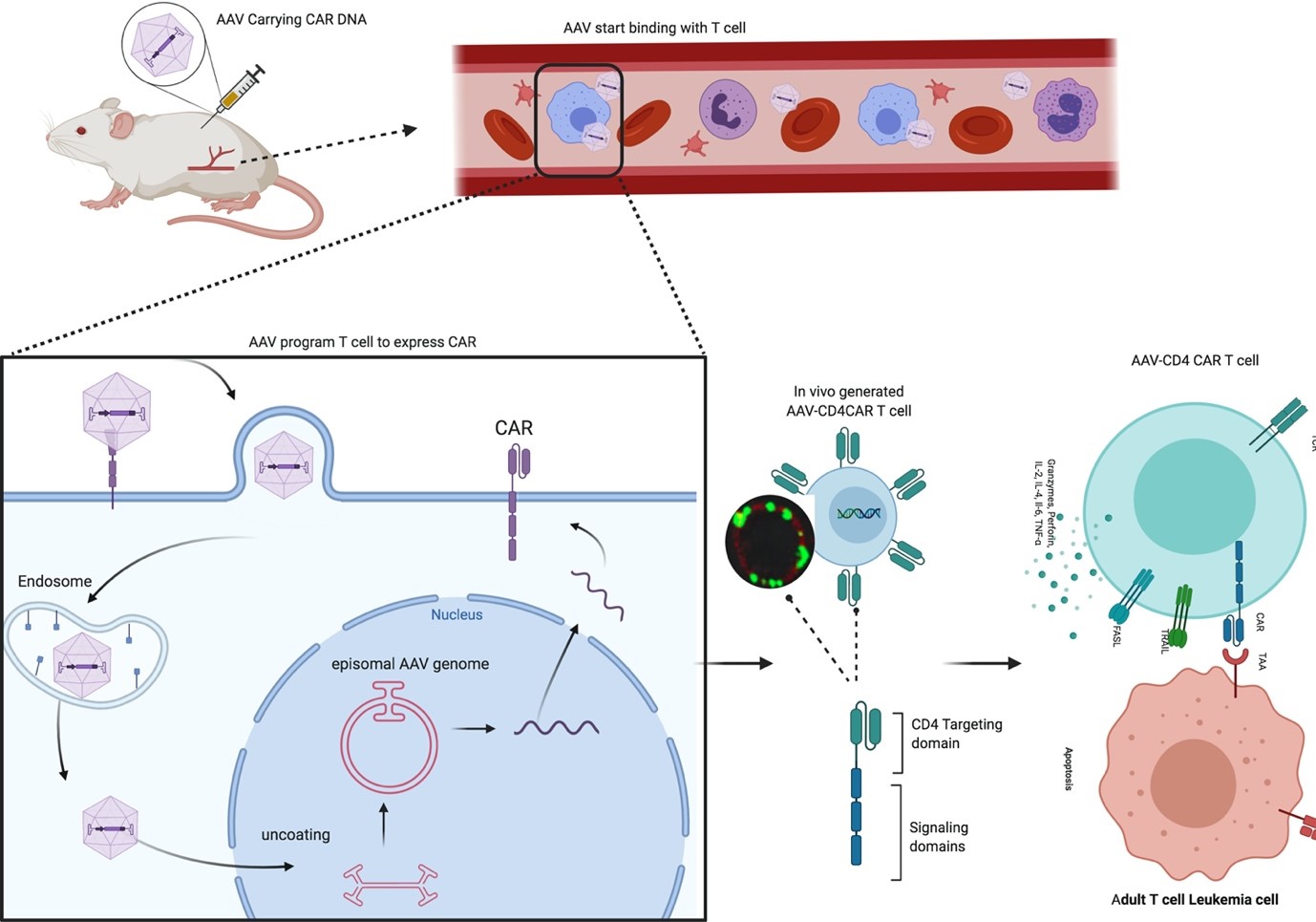AAV-Mediated In Vivo CAR Gene Therapy for Targeting Human T Cell Leukemia
Published in Cancer
Cellular immunotherapies have brought excitement to immuno-oncology research and hope to cancer patients who are out of treatment options. The most popular form of cellular therapy are chimeric antigen receptor (CAR) T cells. These cells are engineered to express a synthetic receptors containing the variable domain of an antibody to redirect their specificity to recognize and eliminate cancer cells upon infusion in host. CAR T cell therapy is in the clinic, approved by FDA for the treatment of B cell lymphoma and mantle cell lymphoma. It is also the subject of many clinical trials, which are assessing its efficacy against cancers such as melanoma and solid tumors. Its therapeutic promise has also motivated biotech start-ups, large pharmaceutical companies, and governments to devote significant investments to the cell therapy space [1]. However, challenges remain to making them more widely available and to being able to deploy them quickly. CAR T cell production is a multiplex system involving cell therapy, gene therapy, and immunotherapy.
Chemotherapy is ubiquitous in oncology not only because it can slow or stop cancers, but because it can be manufacture quickly and inexpensively. They can also be produced in relatively large amounts, easily shipped and stored. CAR-T therapies are the opposite. Normally, the manufacturing of these cells requires the removal of a patient’s T cells from a blood sample at a specialized center, freezing the cells, shipping them to a CAR-T manufacturing site, thawing them, their genetic engineering with a viral vector, freezing them for the return trip, rethawing, and finally infusing them back into the host. In Novartis, this usually take 22 days. Given the complexity and urgency of the process, the company has priced its anti-CD19 treatment at US$475,000 for a single infusion, roughly seven times as much as a typical chemotherapy regimen. This multiplex system of CAR T cell production limits the therapeutic potential of CAR T cells to a few tumor types and specialized centers around the globe [2]. The hurdles mentioned above render CAR-T to outcompete chemotherapy as the front-line therapy.
AAV has been intensively investigated for gene therapy in preclinical and clinical studies. AAV vectors are among the most suitable tools for in vivo gene delivery due to their superior infection efficiency and unique biological and biophysical properties [3]. AAV shows persistent transgene expression and long-term correction of disease phenotype with little or no toxicity in clinical and preclinical studies [4]. In our current study, we used AAV equipped with a synthetic gene to manipulate immune cells. In this new approach to CAR T cell manufacturing, Nawaz et al. skip the petri dish and head straight to the humanized mouse. Using AAV , vector carrying the CAR gene, which we call AAV delivering CAR gene therapy (ACG), circulating T cells can be quickly programmed in vivo with CD4 CARs. An interesting outcome of our study was that AAVs are capable of producing enough in vivo CAR T cells upon a single infusion, and these T cells are potent as ex vivo-generated CAR T cells. Furthermore, once produced, they act as a living drug, are distributed throughout the host, and circulate in the host body for weeks, with the ability to recognize and destroy target cells. AAV vectors lack engineered lipids and chemical components and are free from viral genes, and thus considered to be safe for gene therapy with limited toxicity [5]. We believe that the cost of ACG will eventually be on a par with chemotherapy.

Graphical illustration showing the experimental pipeline and mechanism of AAV delivering CAR gene therapy (ACG). AAV carrying the CD4CAR gene are infused in the host body, where AAV infects the lymphocyte, and delivers its CAR cargo into the cell nucleus. The immune effector cells reprogram into tumor specific CAR cells, which are capable of recognizing and destroying the tumor.
Next steps and other applications
Our ACG approach still has several challenges before translating into human trials. The most important is to test the specificity of ACG in larger pre-clinical model. We are pursuing new strategies to make the gene-delivery-and-expression system safe in people and will work with companies that have the capacity to produce clinical-grade AAV.
In addition to the in vivo CAR T cells generation, we believe that given further optimization, our ACG strategy may lay the foundation for in vivo T cell manipulation in immunotherapy beyond cancer and infectious diseases. We believe that the ACG strategy will substantially streamline the manufacturing process of cell-based therapies in the clinical setting and will make genetically engineered cell treatment less expensive and more effective.

From left to right: Waqas Nawaz, first author; Prof. Wu Zhiwei, Principal investigator; Dr. Wu Xilin, Corresponding author.
References
[1] S. Charrot, S. Hallam, CAR-T Cells: Future Perspectives, Hemasphere 3(2) (2019) e188-e188.
[2] X. Wang, I. Rivière, Clinical manufacturing of CAR T cells: foundation of a promising therapy, Molecular Therapy - Oncolytics 3 (2016) 16015.
[3] F. Mingozzi, K.A. High, Therapeutic in vivo gene transfer for genetic disease using AAV: progress and challenges, Nature Reviews Genetics 12 (2011) 341.
[4] J.M. Brady, D. Baltimore, A.B. Balazs, Antibody gene transfer with adeno-associated viral vectors as a method for HIV prevention, Immunological reviews 275(1) (2017) 324-333.
[5] M.F. Naso, B. Tomkowicz, W.L. Perry, 3rd, W.R. Strohl, Adeno-Associated Virus (AAV) as a Vector for Gene Therapy, BioDrugs 31(4) (2017) 317-334.
Follow the Topic
-
Blood Cancer Journal

This journal seeks to publish articles of the highest quality related to hematologic malignancies and related disorders.

Please sign in or register for FREE
If you are a registered user on Research Communities by Springer Nature, please sign in